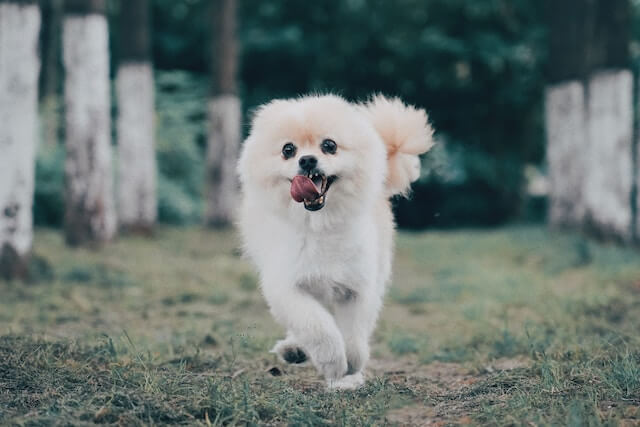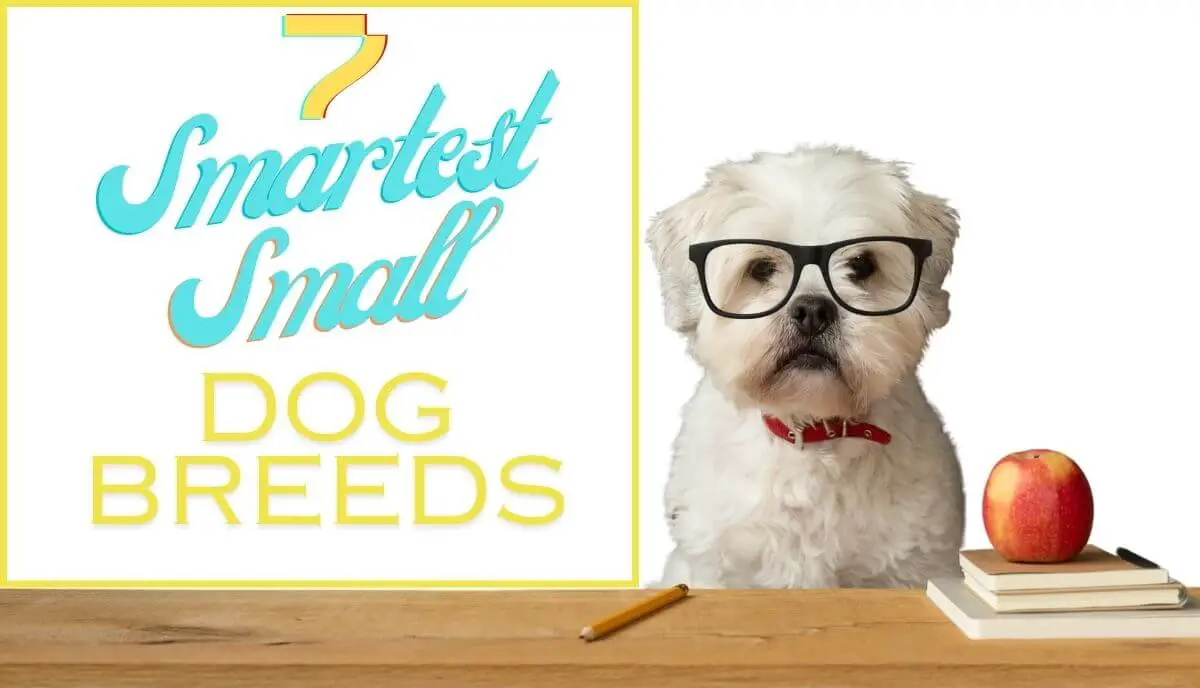Did you know that some of the smallest dog breeds are actually among the smartest? Welcome to our exploration of the smartest small dog breeds!
In this post, we’ll discover some petite pups who pack a punch in intelligence. From the swift-learning Papillon to the quick-witted Yorkshire Terrier, these small but mighty breeds will amaze you with their mental prowess.
Join me as we discover some of the most intelligent small dogs and their rankings in canine intelligence.
Smartest Small Dog Breeds
| Dog Breed | Size | Intelligence Ranking |
| Papillon | 4-9 lbs, 8-11 inches | 8th |
| Miniature Poodle | 10-15 lbs, 10-15 inches | Not specifically ranked, but shares traits with Standard Poodle (2nd) |
| Shetland Sheepdog | 14-27 lbs, 13-16 inches | 6th |
| Cocker Spaniel | 20-30 lbs, 13.5-15.5 inches | 20th |
| Pomeranian | 3-7 lbs, 6-7 inches | 23rd |
| Yorkshire Terrier | 4-7 lbs, 7-8 inches | 27th |
| Cardigan Welsh Corgi | 25-38 lbs, 10.5-12.5 inches | 26th |
Papillon

Ranked as the 8th overall in canine intellect, Papillons are not just the smartest among small breeds but also show remarkable problem-solving skills and adaptability.
Their alertness and keen perception make them quick learners, adept at understanding and responding to commands.
Eager to please and highly trainable, they excel in obedience and agility tasks.
Shetland Sheepdog

With a 6th place ranking in global dog intelligence, Shetland Sheepdogs exhibit advanced herding instincts and exceptional learning ability.
Their keen sense of understanding and ability to anticipate commands make them excellent in obedience and agility.
Shelties are also highly trainable and respond well to positive reinforcement training methods.
Cocker Spaniel

Standing at the 20th position in intelligence, Cocker Spaniels display a keen eagerness to learn and adapt to various training scenarios
They are quick to understand commands and show a high level of responsiveness in training.
What’s even more, their willingness to please makes them responsive to training, and they excel in activities that require both intelligence and agility.
Pomeranian

Pomeranians, ranking 23rd, are among the brightest of small breeds, known for their alertness and capability to learn tricks and commands swiftly.
Their curiosity and eagerness to engage make them quick learners, especially in activities that require mental agility.
They thrive in environments where they can engage in interactive play and learning.
Yorkshire Terrier

Ranking 27th in overall dog intelligence, Yorkshire Terriers are adept at learning and executing commands, demonstrating their sharp cognitive abilities.
Their alert nature and keenness to engage in training sessions highlight their intellectual capacity.
Yorkies generally respond well to consistent training and enjoy activities that challenge their minds.
Cardigan Welsh Corgi

The Cardigan Welsh Corgi, ranking 26th, shows remarkable herding intelligence, coupled with a keen ability to learn and follow commands.
Their problem-solving skills and responsiveness make them adept at various canine sports and activities.
In addition, they are known for their attentive and eager-to-learn nature, which makes training both effective and enjoyable.
Miniature Poodle

The Standard Poodle, known for its larger size, holds the title of the second most intelligent dog breed globally. Although the Miniature Poodle’s exact rank in intelligence isn’t specified, it shares the same remarkable intellect as its larger counterpart, the Standard Poodle.
However, this smaller version demonstrates equally impressive abilities in learning and problem-solving. They are also quick to pick up on training and adept at understanding complex instructions.
Furthermore, responsive and eager to please, Miniature Poodles excel in obedience and agility training.
How Dog Intelligence is Measured
Understanding dog intelligence involves more than just observing how fast a dog can learn a new trick. Stanley Coren, a renowned canine psychologist, developed a comprehensive method to assess the intelligence of dogs, as detailed in his influential book, “The Intelligence of Dogs.”
Coren’s method categorizes canine intelligence into three distinct types: instinctive intelligence, adaptive intelligence, and working and obedience intelligence.
Let’s explore each of these in more detail, using a creative analogy for clarity.
- Instinctive Intelligence: This refers to the natural abilities and skills that a dog is born with, often directly related to the tasks the breed was originally developed for.
- Adaptive Intelligence: This type of intelligence involves a dog’s ability to solve problems on their own, learn from their environment, and adapt to new situations without human intervention.
- Working and Obedience Intelligence: This category is about a dog’s ability to learn from humans, including how quickly and effectively a dog can understand and respond to commands and training.
The bottom line is that Coren’s framework for measuring dog intelligence offers a multi-dimensional perspective, recognizing that canine intelligence is not a one-size-fits-all attribute but rather a spectrum of capabilities and aptitudes unique to each dog and breed.
This approach helps us appreciate the diverse intellectual strengths dogs possess, whether it’s their innate abilities, adaptive problem-solving skills, or their capacity to learn from and interact with humans.
